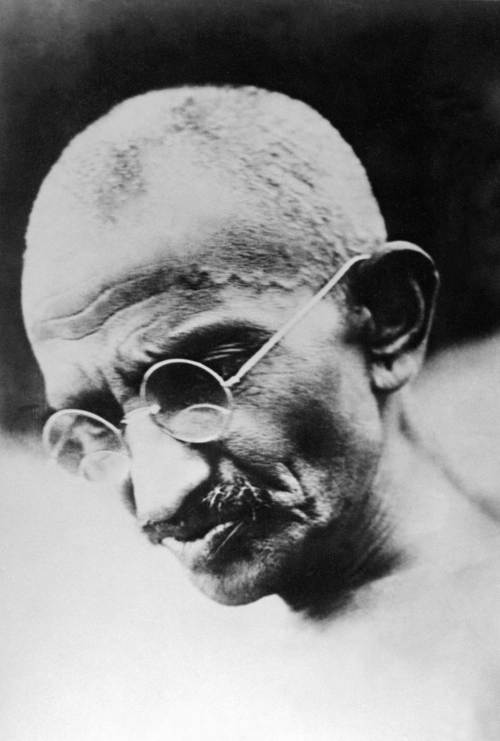Revolutionary book that inspired Gandhi turns 150
By Park Min-youngPublished : Jan. 3, 2011 - 19:47
WASHINGTON (AFP) ― It was 150 years ago that the book “Unto This Last” was published, a groundbreaking work that turned economic thinking on its head and profoundly influenced the views of many including Mahatma Gandhi, the father of Indian independence.
Gandhi first read the subversive masterwork of political economy by John Ruskin in 1904, during a train trip in South Africa where he was living at the time.
“The book was impossible to lay aside, once I had begun it,” wrote the progenitor of the non-violence resistance movement years later in his autobiography.
“It gripped me. Johannesburg to Durban was a twenty-four hours’ journey.
The train reached there in the evening. I could not get any sleep that night. I determined to change my life in accordance with the ideals of the book,” Gandhi wrote.
Gandhi first read the subversive masterwork of political economy by John Ruskin in 1904, during a train trip in South Africa where he was living at the time.
“The book was impossible to lay aside, once I had begun it,” wrote the progenitor of the non-violence resistance movement years later in his autobiography.
“It gripped me. Johannesburg to Durban was a twenty-four hours’ journey.
The train reached there in the evening. I could not get any sleep that night. I determined to change my life in accordance with the ideals of the book,” Gandhi wrote.

“I believe that I discovered some of my deepest convictions in this great book,” he wrote, adding the work “captured me and made me transform my life.”
Ruskin was a middle-aged writer and art critic who already had two well-received works ― “The Seven Lamps of Architecture” and “The Stones of Venice” ― when he wrote “Unto This Last.”
The book, a radical critique of capitalism that up-ended Victorian-era England when it was published in December 1860, appeared first as a series in four issues of “Cornhill Magazine.” It was bound as a single volume 18 months later.
It caused uproar by rejecting the classical theories of economists like Adam Smith, David Ricardo and John Stuart Mill.
The book redefined humans as complex beings often driven by emotions and motivations that cannot be explained by the laws of supply and demand.
The title “Unto This Last“ is taken from the Gospel of St. Matthew, chapter 20.
The New Testament Bible passage tells the parable of a vineyard owner who hires day laborers at a marketplace. Some of the men were hired early in the morning, while others were taken on later during the course of the day.
At the end of the day all the workers received the same wages of a penny ― to the consternation of those who had toiled away since early morning.
But the vineyard owner’s reply was: “Friend, I do thee no wrong. Didst not thou agree with me for a penny? Take that thine is, and go thy way. I will give unto this last even as unto thee.”
Ruskin believed that the theory of supply and demand resulted in misery for workers, because it encouraged them to sell their labor at a discount when jobs were scarce.
He attacked the very foundations of classical economic thought by rejecting the belief of homo economicus, the concept that humans are motivated primarily by self-interested economic reasoning.
Ruskin rejected the “unfettered markets” that justify and encourage economic inequality. He also gave new meaning to many of the terms in the economists’ lexicon, such as utility, wealth, value, exchange.
“There is no wealth but life,” Ruskin wrote.
Responding to those who claim that hoarding wealth is the path to greater happiness, he wrote: “That man is richest who, having perfected the functions of his own life to the utmost, has also the widest helpful influence, both personal, and by means of his possessions, over the lives of others.”
The book profoundly influenced Gandhi, who translated the work into his native Gujarati.
The values that Ruskin espoused ― especially the view that whatever benefits the individual also benefits the group as a whole ― figured prominently in Gandhi’s teachings and writings.
In a 2010 academic article, Lancaster University economics professor Christopher May described Ruskin’s embrace of an “ethic of responsibility.”
“Rather than suggest that large and impersonal economic forces are to blame for unpalatable economic outcomes, it is our unthinking acceptance of the presentation of this market logic that causes difficulties,” May wrote.
In Ruskin’s world, “economic change is driven by individual ethical choices, not rational material interests,” May wrote.
He added that Ruskin believed “we can choose how to treat others, and these choices have consequences” ― a view of homo economicus with which Gandhi would have heartily concurred.






![[KH Explains] How should Korea adjust its trade defenses against Chinese EVs?](http://res.heraldm.com/phpwas/restmb_idxmake.php?idx=644&simg=/content/image/2024/04/15/20240415050562_0.jpg&u=20240415144419)











![[Today’s K-pop] Stray Kids to return soon: report](http://res.heraldm.com/phpwas/restmb_idxmake.php?idx=642&simg=/content/image/2024/04/16/20240416050713_0.jpg&u=)